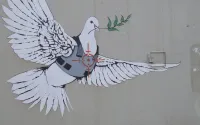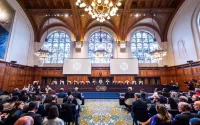31 January 2006ABC NetLisa Millar
MARK COLVIN: Australia's hot summer has had a devastating effect on the Great Barrier Reef. Scientists say they're stunned by the amount of coral that's already been bleached.The coral specialists just back from diving around the Keppel Islands are comparing the severity of the damage to the worst case ever recorded. That was in 2002, when 60 per cent of the reef was bleached.The scientists say the entire reef may now be at risk of destruction from global warming.Lisa Millar reports.LISA MILLAR: Diving on the inshore reefs around the Keppel Islands off Rockhampton, the University of Queensland scientists were shocked the underwater scene that greeted them.Professor Ove Hoegh-Guldberg:OVE HOEGH-GULDBERG: Even though we're really in the early part of summer, most of the reefs we saw were 100 per cent bleached. This was going down to about 10 metres. And it was almost every piece of coral there was a gleaming white colour, often with some of the coral fluorescent pigments left behind, but all of that brown colour due to the symbiotic algae that live in corals had disappeared, and so that was really quite surprising for us.LISA MILLAR: Surprising, because it looked as bad as when he dived the reef in 2002. But that was in April, after several more months of summer heat. To see the damage in January was alarming.Professor Hoegh-Guldberg, whose work on coral reefs is internationally respected, is praying for two months of cyclonic stormy weather to stir up colder deeper water, the only thing that will save the coral.OVE HOEGH-GULDBERG: Asking for two months of stormy weather is probably a big ask and I think if we get to a couple of weeks of sunny weather in the still conditions that we often see in the summer, we're going to have a problem.LISA MILLAR: Professor Hoegh-Guldberg chairs a group that's part of the largest international network of coral reef scientists in the world.Funded by the World Bank, the group is now on high alert and the fact that normally reserved scientists are issuing such alarming statements has the Australian Conservation Foundation's Don Henry worried.DON HENRY: The important thing from this warning from the scientists is we're starting to see the damage to the reef from warmer waters, from climate change, happen more often and become more extensive and there's going to be a point when the reef just doesn't recover.LISA MILLAR: With February, the hottest month, just ahead, this is a critical time.The last severe cases of bleaching occurred in 1998 and 2002, the last leaving more than five per cent of the reef destroyed.Professor Ove Hoegh-Guldberg is convinced global warming is to blame.OVE HOEGH-GULDBERG: No-one with any credibility in this field is doubting that we're seeing the first signs of a major change to an ecosystem due to climate change.And it just simply underscores the absolutely critical importance of getting greenhouse emissions under control as a global society, because with very little extra warming we could see a world in which we don't have things like the Great Barrier Reef.Now, for Australia from an iconic point of view, and also from a $5 billion economic support that the reef gives, that would be an absolute tragedy.MARK COLVIN: Professor Ove Hoegh-Guldberg speaking to Lisa Millar.






